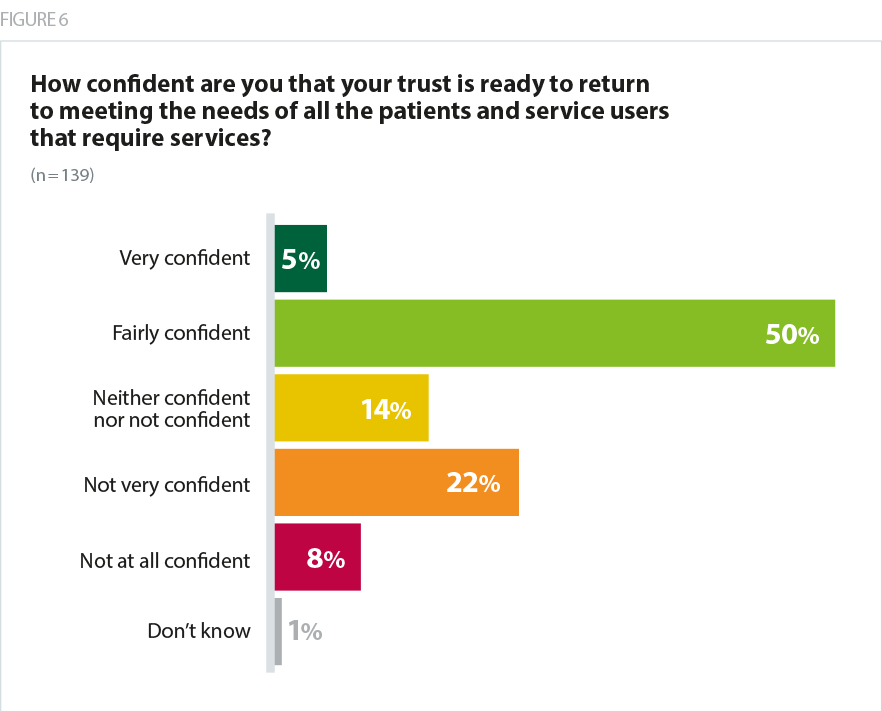Since being asked to resume providing some non-emergency services, trusts are putting in place measures to ensure they can do this safely. However, important questions remain about how quickly trusts will be able to return to the levels of productivity and the range of services they were able to offer before the pandemic, with significant IPC restrictions still in place and uncertainty about a potential second peak:
- around half (55%) of trust leaders overall are confident (very confident or fairly confident) that their trust is ready to return to meeting the needs of all patients and service users in need of care
- however, confidence levels vary considerably by sector, with acute trusts and combined acute and community trusts least likely to say they are confident in their readiness to return to providing a comprehensive level of services to non-COVID patients (37% and 42% respectively) - around a sixth (14%) were neither confident nor not confident
- Mental health and learning disability (82%) and community trusts (80%) were more likely to express confidence in meeting the needs of all patients, and in many cases trusts of this type have continued to provide a full level of service or even increased their capacity, in support of the acute response to COVID-19 and the implementation of the discharge to assess model.

Trusts cited a range of factors which will enable them to resume providing elective and non-emergency services, including improved testing regimes, access to PPE, and streamlining of services in line with IPC measures. Trusts have expressed some concern about the limitations created by a lack of available testing capacity, and are clear this forms a critical part of the process of restoring non-COVID-19 services.
We…do not have a lab facility to do our own testing which is tricky. We have been discussing using Optigene to assist with our testing regime alongside the government's test track and isolate.
acute specialist trust
Clarity around the testing and clear IPC guidance, aligned with royal colleges are the key limiting factors. To increase elective capacity and start to reduce waiting times we will need long term use of the independent sector and also some additional theatre capacity.
acute trust
However, they also emphasised how conditional their response is on the myriad variables impacting on the capacity of ‘day-to-day’ services, in particular the timing and magnitude of any future peaks in cases. Many said that they wished government would make more information available about the likelihood and timing of future outbreaks and localised spikes in the number of cases to assist with planning. There was also a widespread view that trusts need funding to meet surge demand and reconfigure estates to support social distancing where required.
We have reduced bed numbers for infection control reasons. We have 20% staff ill or isolating. Staff need to don and doff etc increasing time needed with each patient.Getting our waiting lists down for both RTT and cancer will be a major focus but will require additional capacity if we are to do it quickly. It also requires the changes seen in primary care to continue and the willingness of clinicians to continue going the extra mile.
Acute trust
It is not clear yet how significant the "surge" in mental health demand will be. National modelling has to date focused on the acute demands. The innovation that has occurred will aid meet increased demand, but we cannot be confident at the moment whether there will be sufficient capacity to meet the anticipated increased demand.
combined mental health/learning disability and community trust
This is incredibly complex and a combination of assessing the needs of patients and potential patients alongside the necessary safety restrictions is very time consuming and intensive. Refocusing the motivations of leaders and staff from a single purpose re COVID19 to one of restoration will be a challenge and we are thinking about how we do this.
Acute trust